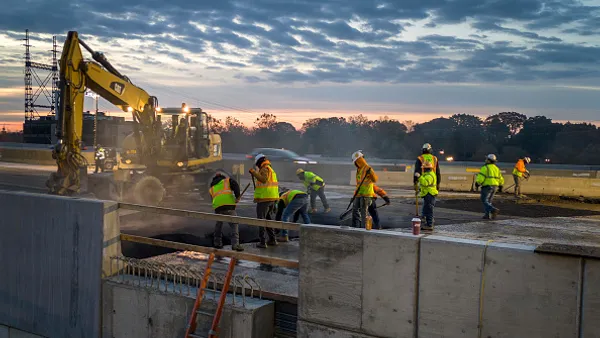Dive Brief:
- A federal judge in California has dismissed the claims of a construction worker's wife who said she contracted COVID-19 after her husband was exposed to the novel coronavirus at work.
- Corby Kuciemba filed a lawsuit against her husband's employer, Victory Woodworks, alleging that Victory knew that another employee had tested positive for COVID-19 but instead of requiring him or her to quarantine, assigned the employee to work with her husband on a San Francisco jobsite. Kuciemba sought damages in excess of $75,000 for medical expenses for at least one hospital stay, lost wages, lost earning capacity, pain and suffering, loss of enjoyment of life and emotional distress.
- U.S. District Judge Maxine Chesney denied Kuciemba's claims, ruling that the allegation that she contracted COVID-19 through direct contact with her husband was barred by California workers' compensation law; the claim that she was exposed "indirectly through fomites such as [her husband's] clothing" was not plausible; and that Victory's "duty to provide a safe workplace to its employees does not extend to nonemployees who, like Corby Kuciemba, contract a viral infection away from those premises."
Dive Insight:
Barring a successful appeal, this decision could be used as an example for other courts that are dealing with the same types of lawsuits or put in the position of deciding liability in states with workers' compensation laws similar to those in California, according to an analysis of the case by attorneys Eric Hobbs and J. Davis Jenkins of the law firm Ogletree, Deakins, Nash, Smoak & Stewart.
Other COVID-19-related regulations have started to work their way through the industry as well. Some states have taken up the issue of whether businesses are liable for COVID-19-related injuries or death.
For example, Florida's new COVID-19 shield law requires a plaintiff to prove gross negligence on the part of the business in order to successfully pursue a claim. As of April 30, according to Bloomberg Law, 20 states have passed legislation that offers some level of protection for employers against COVID-19 liability.
In addition, OSHA implemented a new National Emphasis Program in March, targeting employers that potentially expose a large number of workers at risk for exposure to the coronavirus.
OSHA has also submitted the text of an emergency temporary standard to the White House for review. Since OSHA has cited Centers for Disease Control and Prevention guidance in issuing its own guidelines for making jobsites safer during the pandemic, it is unclear as to how evolving CDC recommendations will impact the agency's proposed ETS.













